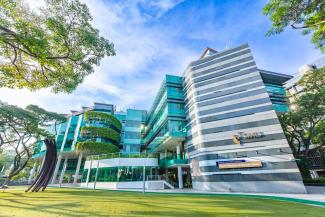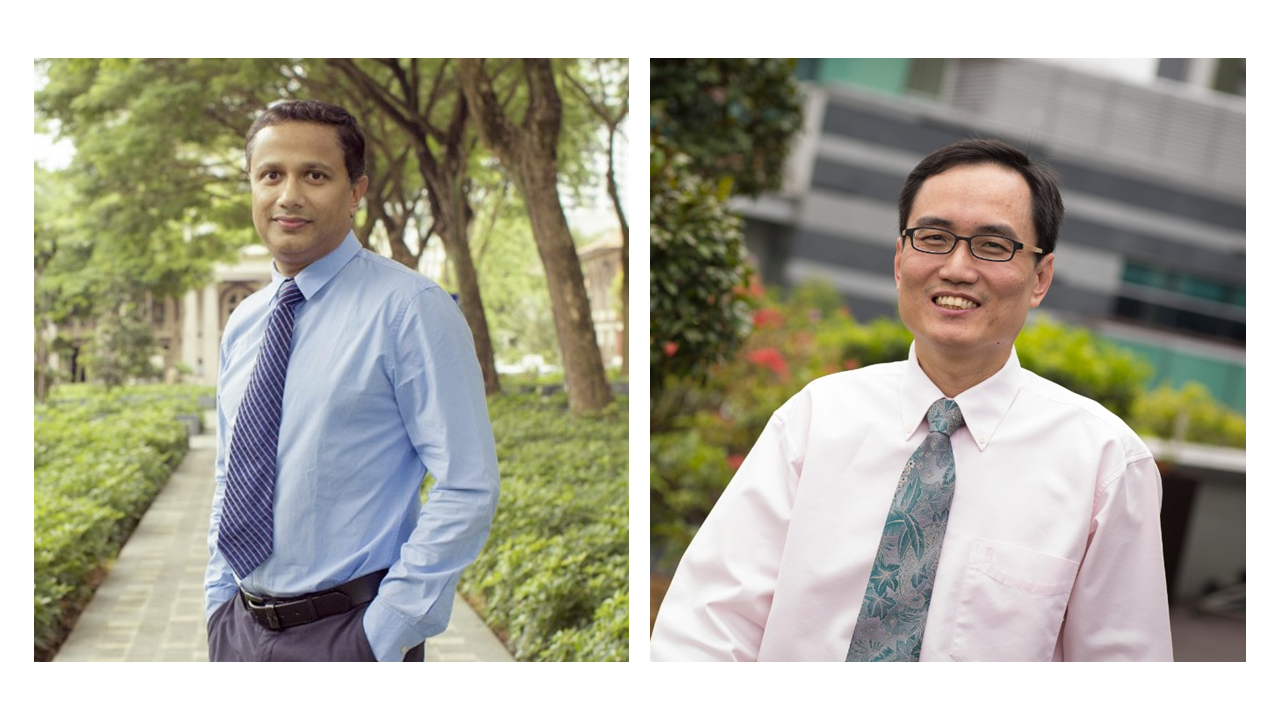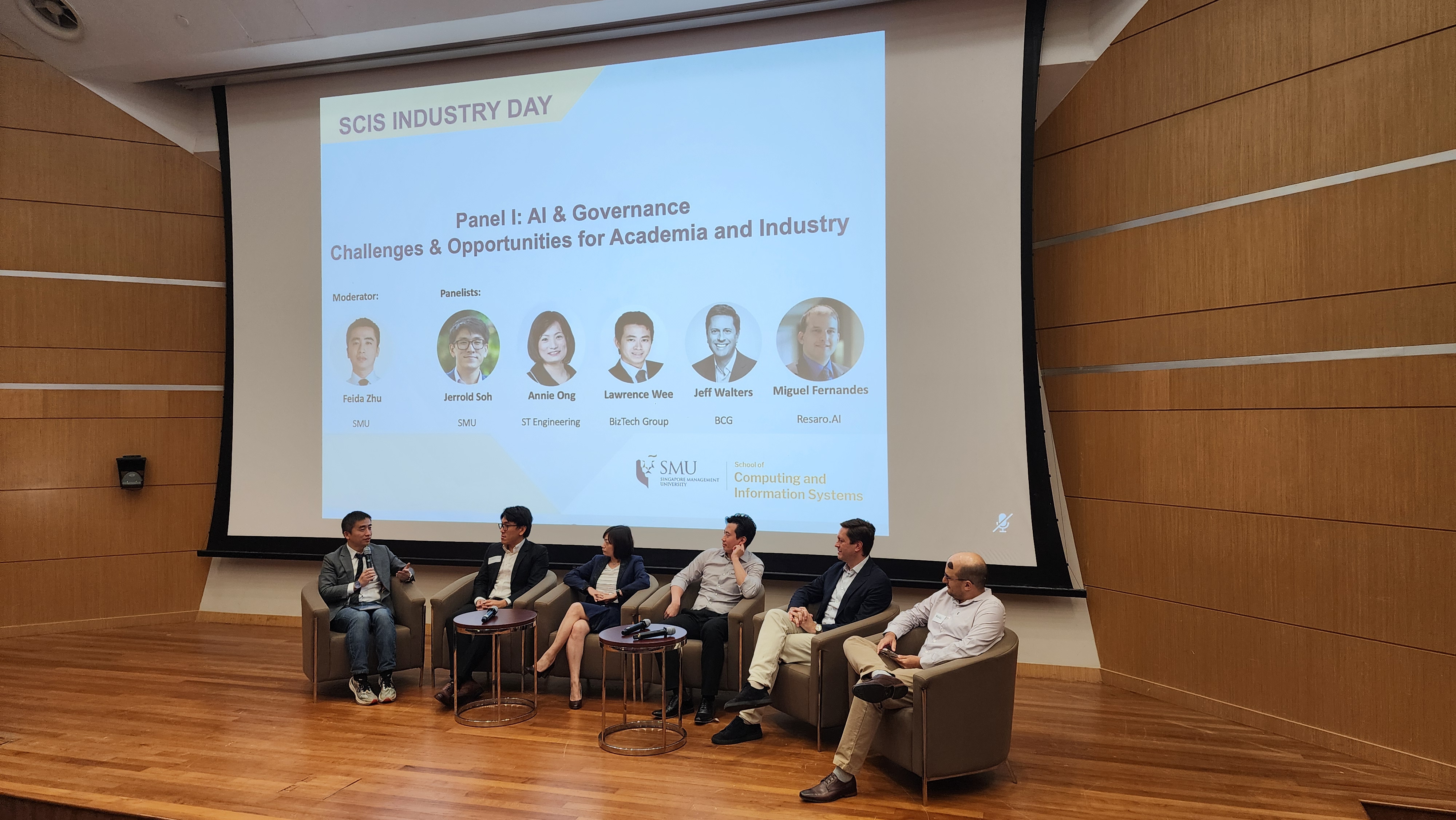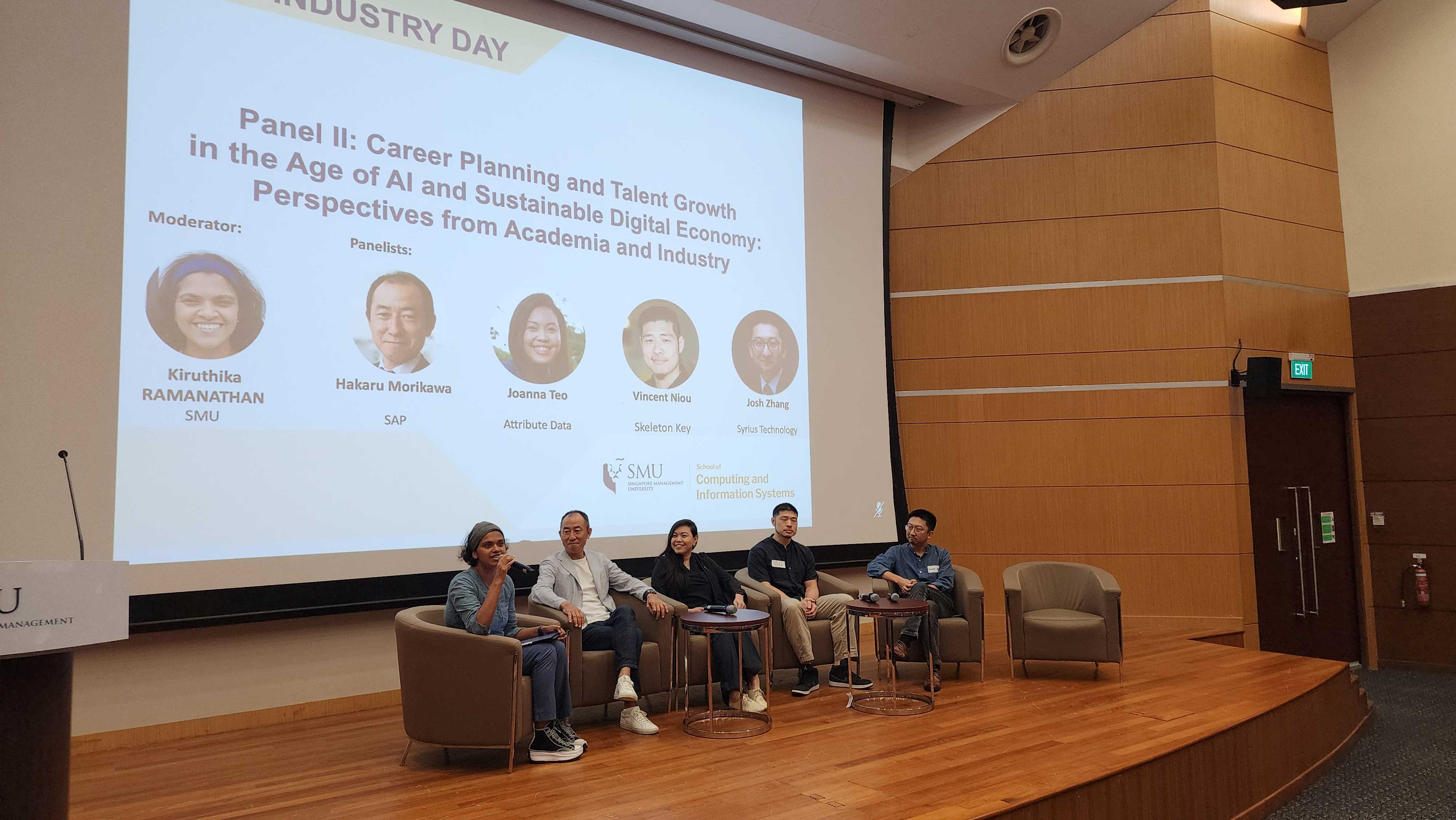
Singapore Management University’s School of Computing and Information Systems (SCIS) held its inaugural Industry Day on 30 September, aimed at fostering dialogue with industry and the public sector on technology opportunities and challenges.
Themed ‘AI & Governance for Sustainable Digital Economy’, the event, which showcased SCIS's research excellence and student growth through talks, panels, and networking sessions, attracted over 100 participants from academia, industry, and government.

High-quality research in innovative areas
In delivering his keynote speech, Professor Archan Misra, SMU’s Vice-Provost (Research), described SCIS as an “under-appreciated gem” for the high-quality research it is conducting.
He said, "Many do not realise that SCIS, with about 100 faculty members, is larger than or comparable to many well-known computing schools worldwide. In reality, SMU is a diversified university that specialises in research and education at the intersection of management, social sciences, and computing, with SCIS anchoring this third pillar of SMU’s research footprint.”
SCIS research, he said, does not cover the entire spectrum of computing but focuses on specific topics and areas with high societal relevance and where its collection of faculty members has critical mass. Additionally, driven by SMU’s mission to bridge the gap between academic research and its practical application in society, SCIS researchers work closely with collaborators in industry and public agencies. “Our goal is to make a meaningful impact in Singapore and Southeast Asia, with a strong focus on delivering value to this region," he added.
In a quick deep dive, Prof Misra highlighted SCIS’ research in areas such as last-mile logistics optimisation, intelligence software systems and security, human-AI synergy for human robot co-working, AI and Web 3.0 technologies and governance, and AI-augmented decision-making for businesses and urban operations.
Some of this research has already led to practical impact, achieved in collaboration with partners based in Singapore. For example, SCIS researchers have applied predictive analytics and spatial optimisation to determine how to pre-position ambulances based on the anticipated demand city-wide, thereby permitting ambulances to respond faster to emergencies.
Similarly, SCIS researchers have developed novel technologies to ensure the safety of Singapore’s digital applications and infrastructure, with some of these innovations now being integrated to provide enhanced protection to Singapore’s widely-used Singpass app. SCIS colleagues are also developing, in collaboration with medical professionals, empathetic companion conversational agents for people suffering from dementia. The researchers are developing innovations in AI that tailor the AI-based agent’s language usage to match local customs in Singapore and ensure that the facial expressions used by the avatar better match the emotions that the agent wants to convey.
A globally recognised computing school
With a history of 20 years, SCIS has been recognised for its research globally, said Dean Professor Pang Hwee Hwa in his opening remarks. He noted that SMU has risen to #2 in Software Engineering for 2023 – up two places from the previous year in the influential CSRankings. This is a metrics-based ranking of top Computer Science institutions around the world which evaluates academics by their publications at the top research conferences in a CS field.
With world-class scientists on the faculty, SCIS pursues research in three areas: Human-machine collaborative systems, information systems and technology, and AI and data science.
He reiterated, “Through SCIS Industry Day, we want to explore how we can further leverage our research expertise to create good solutions for industry. SCIS graduates are well-received by industry because we work closely with industry to design and deliver our courses, particularly through work-study and internship arrangements that allow students to use their knowledge at work.”
He also disclosed that SCIS graduates are among the most sought-after in Singapore. According to the Graduate Employment Survey 2023, SMU’s Information Systems graduates earned a mean gross monthly salary of $5,530, while Computer Science graduates earned a mean gross monthly salary of $6,120. SCIS’ Master of IT in Business (MITB) programme was also been ranked 2nd in Asia and 24th worldwide in the newly released 2025 QS Global Master’s in Business Analytics Rankings.
Student enrolment now stands at over 3,000 students, from undergraduate to Doctor of Engineering levels. SCIS also has an alumni network of almost 6,400.
Shaping the next generation

Two panel discussions explored how academia and industry can deal with the challenges of AI.
The first panel focused on ‘AI & Governance: Challenges & Opportunities for Academia and Industry’ and was moderated by Associate Professor of Computer Science Zhu Feida, who is also SCIS’ Associate Dean for Partnerships and Engagement.
Panellists emphasised the importance of establishing a robust ethics framework for data collection. They highlighted the necessity of continuously refining algorithms to ensure that the solutions derived are grounded in a transparent model capable of explaining its outcomes. Universities thus have a pivotal role in fostering the mindset of future leaders in the AI ecosystem.

The second panel of the day was moderated by Dr Kiruthika Ramanathan, Director, MITB (Digital Transformation) Programme, focusing on ‘Career Planning and Talent Growth in the Age of AI and Sustainable Digital Economy: Perspectives from Academia and Industry’.
As AI becomes more prevalent in screening candidates for jobs and scholarships, individuals need to master self-presentation and acquire adjacent skills sets. Embracing online collaboration and fostering interdisciplinary knowledge, along with the confidence to learn new competencies, are vital.
With the growing emphasis on lifelong learning, educational institutions have a crucial role in training students to think creatively and adaptively. They should focus on equipping learners with the ability to define problems independently, rather than merely responding to predefined challenges.
Assoc Prof Zhu said these conversations at the inaugural SCIS Industry Day have helped SCIS to build connections with the industry and ensure deepening collaborations.
“The success of SCIS Industry Day is not possible without the support and contribution from everyone in our SMU community, I am delighted that this event has facilitated conversations and dialogues which will, no doubt, foster closer ties and strong, and in-depth collaborations with industry partners for greater societal impact.”